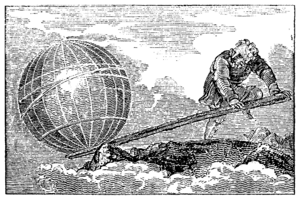Archimedean point facts for kids
An Archimedean point (pronounced Ar-ki-MEE-dee-an) is a special idea about having a perfect way to see things. Imagine being able to look at something from a place where you can understand it completely, without any personal feelings or biases getting in the way. It's like having a "God's-eye view" – seeing everything clearly and objectively.
This idea means trying to step back from what you are studying. This way, you can see how it connects to everything else, without your own thoughts or opinions changing how you see it.
For example, a philosopher named John Rawls used a similar idea. He imagined people deciding what is fair and just from behind a "veil of ignorance." This means they wouldn't know their own social status, talents, or beliefs. This helps them make choices that are truly fair for everyone, not just themselves.
Where the Idea Comes From
The name "Archimedean point" comes from the famous ancient Greek mathematician and inventor, Archimedes. He is said to have claimed that he could lift the entire Earth if he had a long enough lever and a solid place to stand. This idea shows the power of finding a perfect starting point to achieve something huge.
Later, a French philosopher named René Descartes used this idea in his book, Meditations on First Philosophy. Descartes was looking for something he could be absolutely sure was true. He wrote that just as Archimedes needed one firm and unmoving point to move the world, he too would have great hope if he could find just one thing that was certain and could not be doubted.
Why Some People Disagree
Some philosophers, especially those who are skeptical (meaning they doubt things) or anti-realist (meaning they question if we can truly know objective reality), believe that an Archimedean point is not possible. They argue that it's very hard, or even impossible, for a person to completely remove their own biases and see things with perfect objectivity. They sometimes call this idea "scientism," suggesting it relies too much on the idea that science can explain everything perfectly.
See Also
- Bird's-eye view
- Observer effect (physics)
- Objectivity (philosophy)
- Objectivity (science)
- The Aleph (short story)
 In Spanish: Punto arquimédico para niños
In Spanish: Punto arquimédico para niños
 | Valerie Thomas |
 | Frederick McKinley Jones |
 | George Edward Alcorn Jr. |
 | Thomas Mensah |


